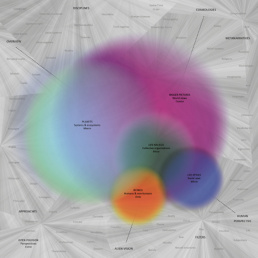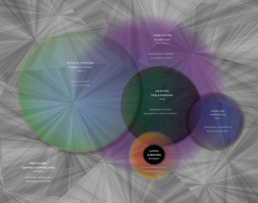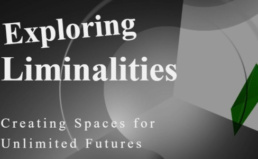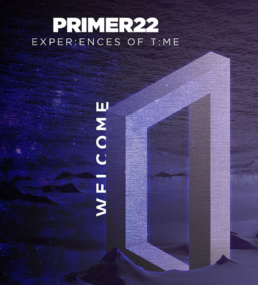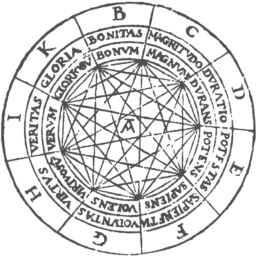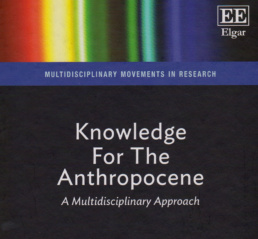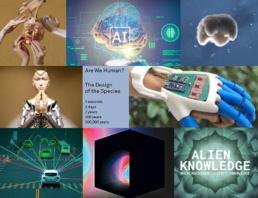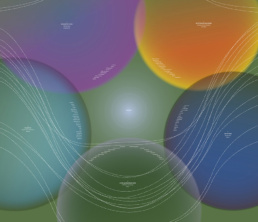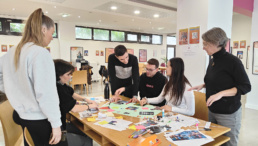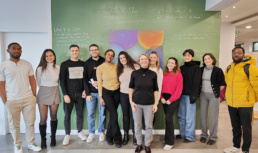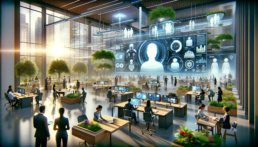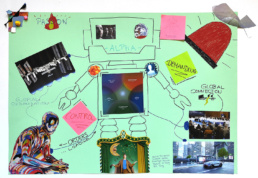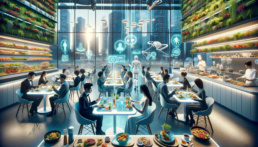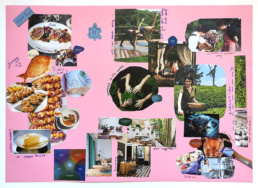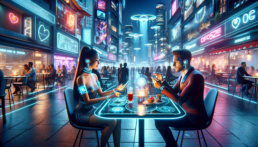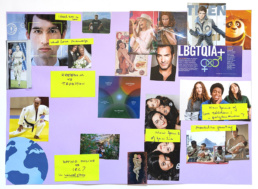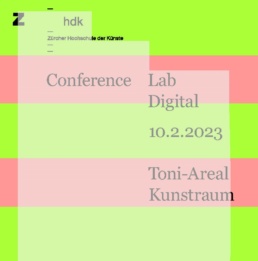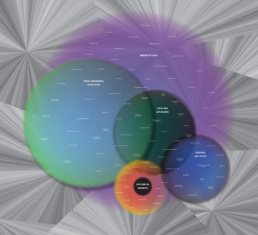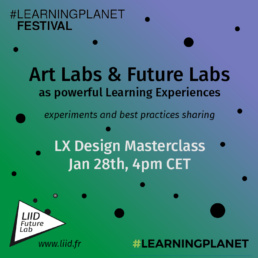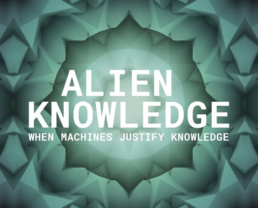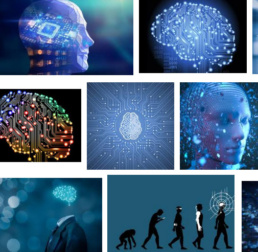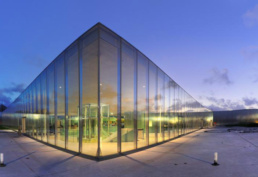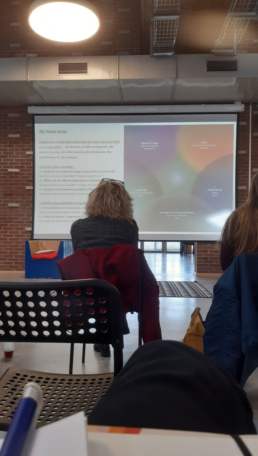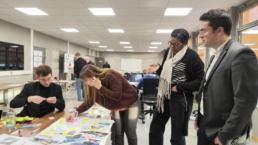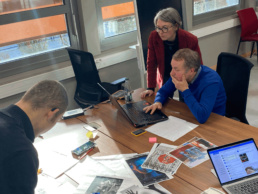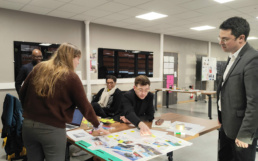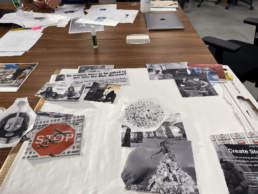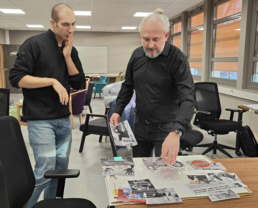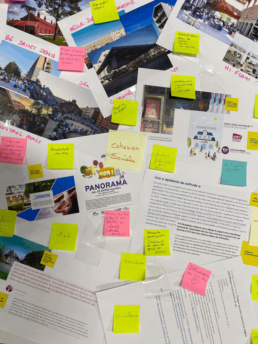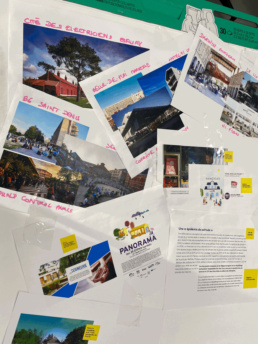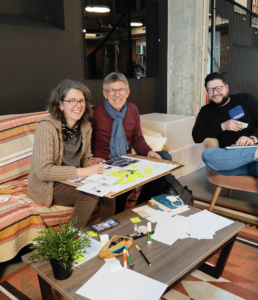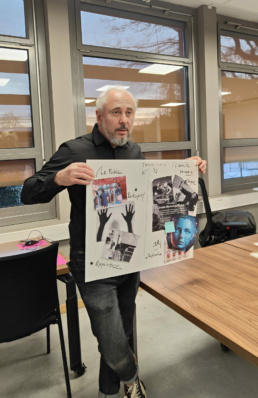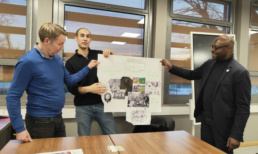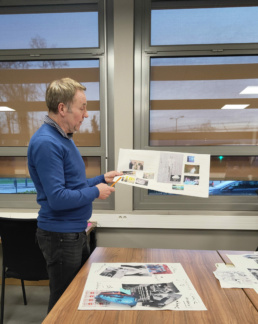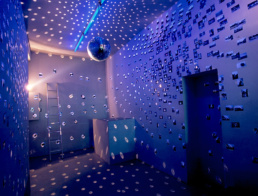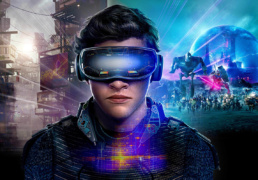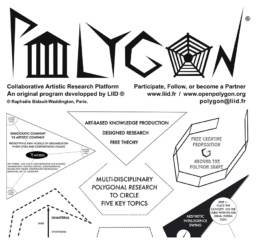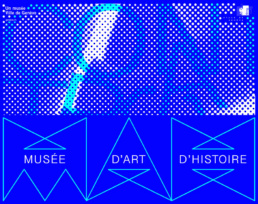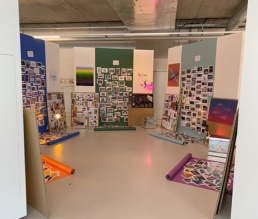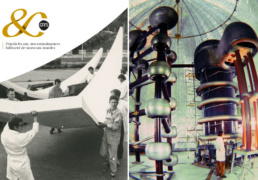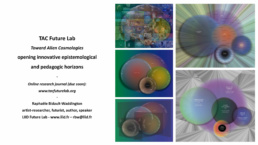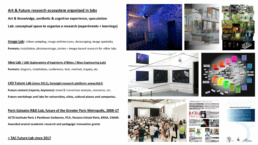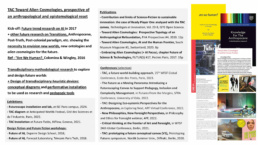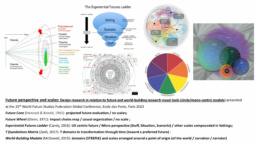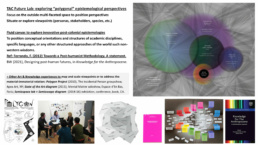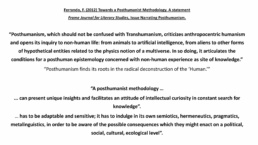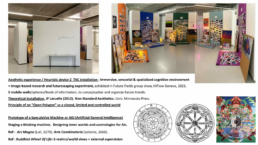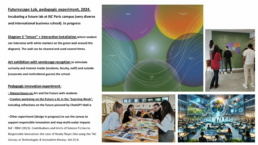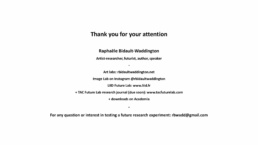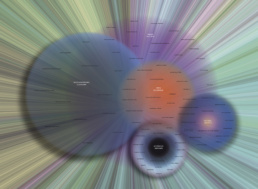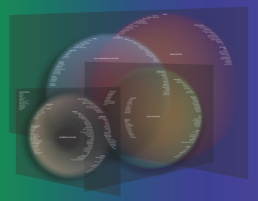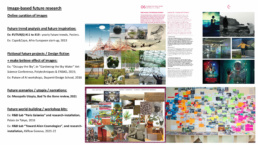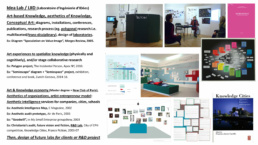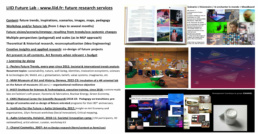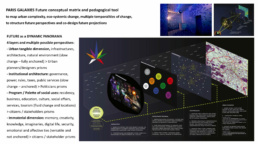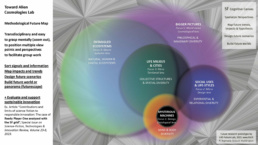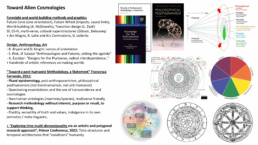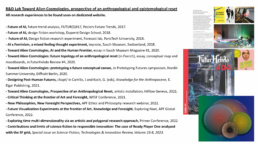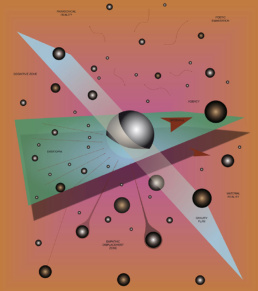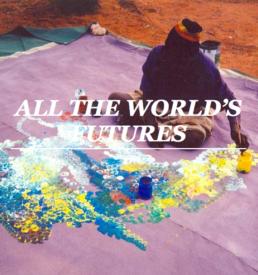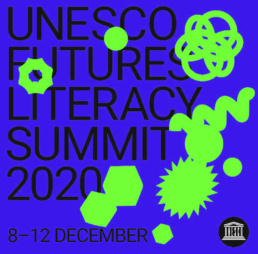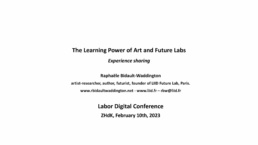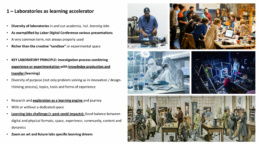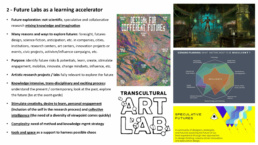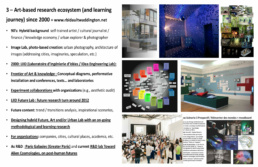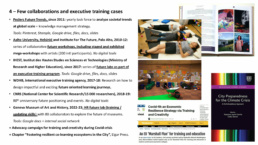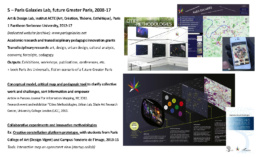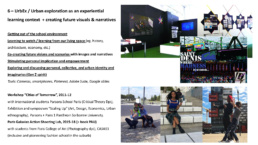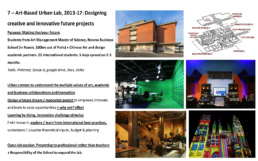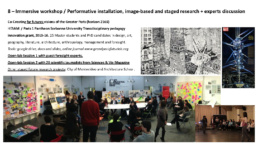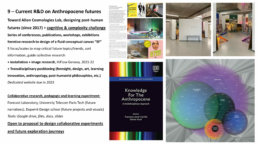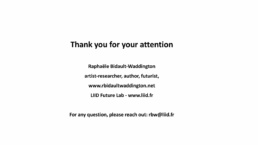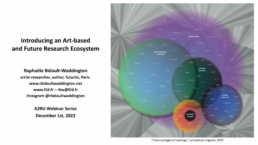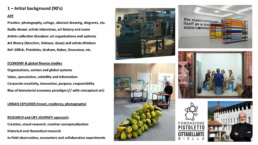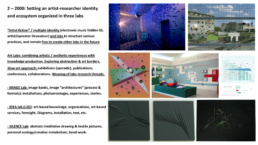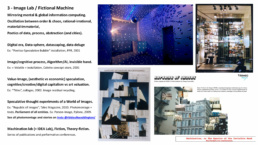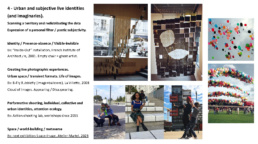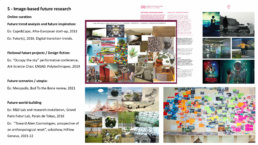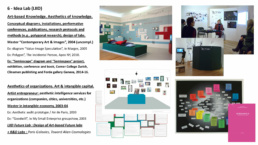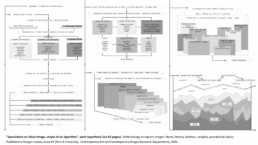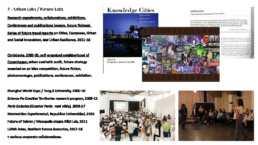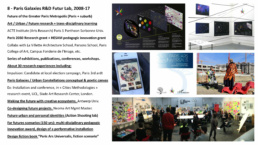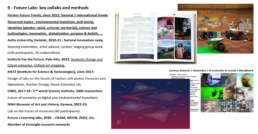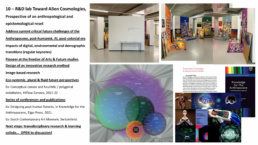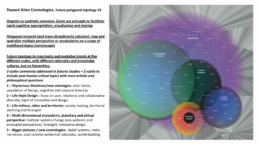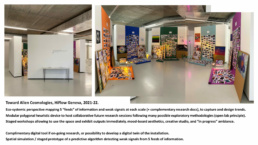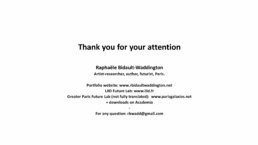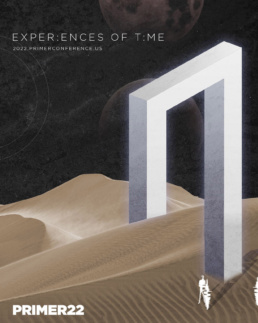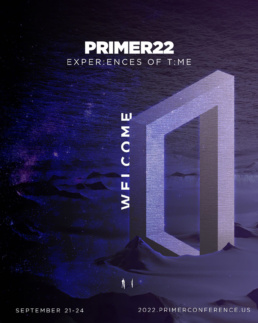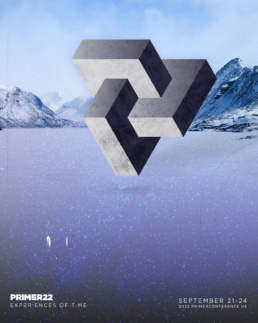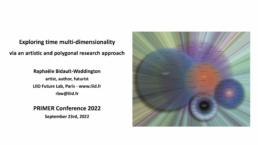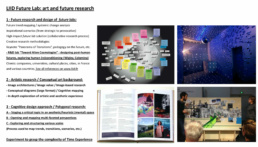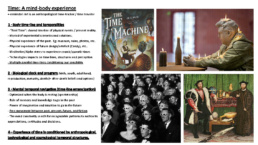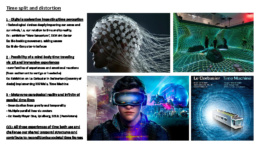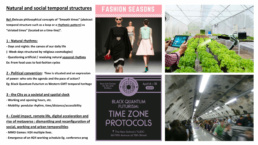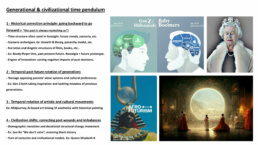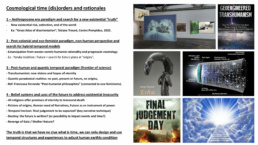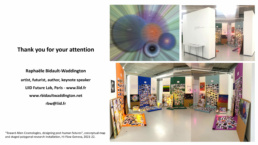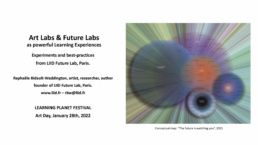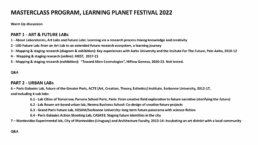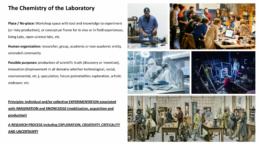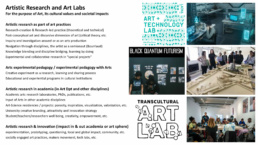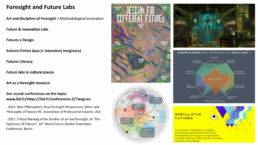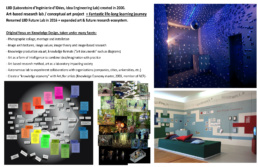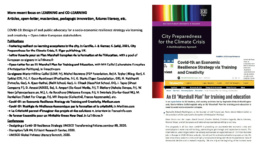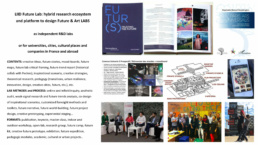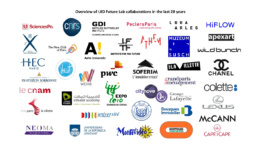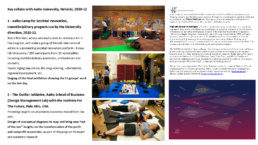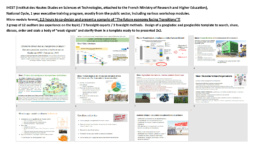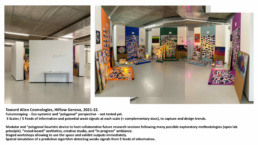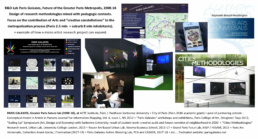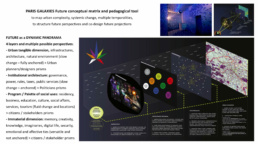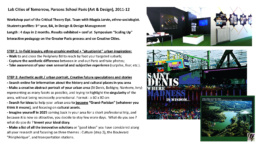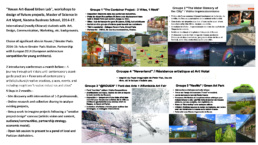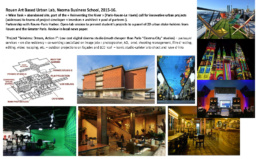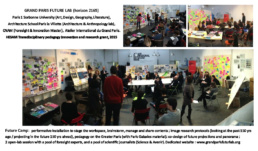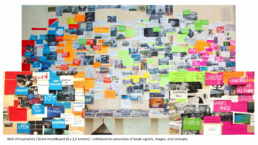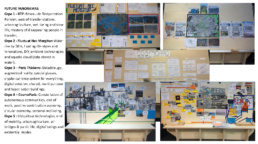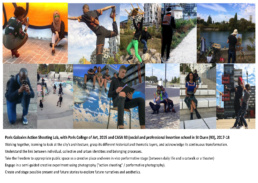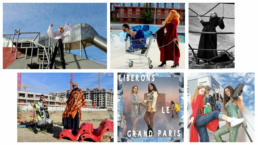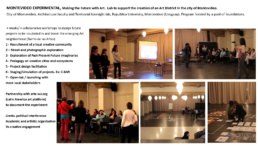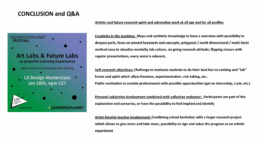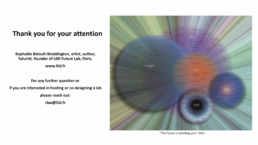Prospective of an epistemological refoundation, NOVA Biennale, Wallonia-Bruxelles Center, 2025
Towards Alien Cosmologies,
Prospective of an epistemological refoundation
Essay and diagram, in Nova XX 2024 Biennale “Pluriverse and Contingency” catalog, Wallonia-Brussels Cultural Center, Paris, 2025
If the major transitions underway raise questions of unprecedented magnitude and shake the edifice of Western modernity, how can we rebuild an understanding of the world? And if these frameworks are deconstructed, how can we imagine new pluriversal cosmologies that give meaning to the world of today and tomorrow, but also allow radically different epistemologies to coexist and converse?-
Combining foresight, artistic research, and post-humanist and post-colonial philosophies, the TAC Future Canvas serves here as a polygonal heuristic map to organize this dialogue by spatializing a diversity of perspectives on tangible and intangible worlds, and by introducing the horizon of the future.
-
Reintroducing the future into the world of knowledge also means giving space to the realm of possibilities, to speculation, to fiction, or even to artistic research to rethink these boundaries of the visible and construct new visions of the world.
About NOVA_XX 2024 ‘Plurivers & Contingency’ at Wallonia-Brussels Cultural Center, Paris, a biennial dedicated to artistic, scientific and technological interweaving in feminine and non-binary mode, and as part of the fourth industrial revolution / 4.0.
Biennale’s Manifesto by its curator Stéphanie Pécourt: The Biennale is dedicated to those who, under the banner of a coalescing and heterogeneous genre, were confined to the margins in the shadow of certainties.
NOVA_XX – liminal space – aims to highlight works and approaches that capture, critique, as much as they acknowledge and incorporate scientific and technological data.
Artworks that are strong in their capacity for decoincidence, for creating tension, and potentiating worlds not yet considered and sinusoidal cartographies. The Biennale de-sequences and is part of an aspiration to epistemic disobedience, in a critical reflection of the ethics of separation and dualisms, in an ode to the Pluriverse – plurality of heterogeneous worlds which reconciles as much nature and culture, as human and non-human. It is an ode to alien performativities, to the living in its incommensurable, and to research in its fundamental….
Download full Manifesto (in French).
Towards Alien Cosmologies, prospective of an epistemological refoundation
This article is a new episode of TAC Future Lab (Toward Alien Cosmologies), an artistic and future research project on the current paradigm shift, shaking the edifice of Western modernity, requiring an anthropological and epistemological refoundation, and calling for innovative pluriversal approaches to the future.
“How can we imagine future worlds when everything is ambiguous and uncertain!?” is its crazy and impossible fundamental question—a question that resonates particularly with the themes and the experiential, meliorist, and prospective universe of the Nova Biennale.
Faced with this dizzying challenge that goes beyond conventional comprehension and rationality, the lab has been exploring new, disruptive and open-ended paths since 2017, through hybrid, artistic and transdisciplinary approaches. This has given rise to creations (diagrams, installations, photomontages, etc.), publications, conferences, masterclasses, workshops, experiments and exhibitions in France and abroad. An online research journal traces all of the lab’s research episodes: tacfuturelab.org
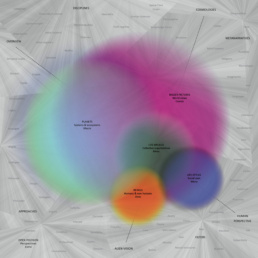
Polygonal Research
The TAC Future Canvas conceptual diagram, a new version of which is presented here, accompanies the lab’s experiments and investigations and is the subject of successive versions exhibited, published, presented or used in workshops. It serves as a mental map and a polygonal (multi-faceted) heuristic tool to envision, situate and explore a very broad spectrum of focal points and perspectives, whether spatio-temporal, conceptual, speculative, subjective, aesthetic or experiential, while remaining fluid and infinite.
The five spheres correspond to five scales to analyze the present world’s transformations and design future worlds, three of which belong to the domains of shared realities (micro, meso, macro), and two open onto invisible and more mysterious dimensions of being and of the universe (onto and cosmo). These five spheres are porous, interconnected, cloudy (each can be duplicated infinitely) and without borders or hierarchies. It is impossible to dissociate or define them, but they allow us to mentally spatialize a semioscape [1] and mark out an imaginary space where knowledge and visions of the world can appear and be mapped.
They draw a floating nebula in a polygonal and infinite background (extro) which puts them into perspective along numerous axes, whether cognitive or temporal, human or non-human (alien). This background forms an open space (Open Polygon) where can be situated a diversity of prisms – whether to analyze the forces moving the world today, to explore future worlds by positioning sets of hypotheses and projections (which is what future research does at different time scales and including historical perspectives) or to anchor, clarify and raise awareness of the cognitive and epistemological biases adopted.
The version of the diagram presented here emphasizes this last dimension, where a myriad of possible entry points, and a dizzying world unto itself, open up, resonating with the current epistemological reset mentioned before, as we shall see.
In this essay (which could be an infinite work), we will journey into this immaterial space and deepen this intersection between worldview, epistemological issues and the art of foresight, hoping to find some clarity there…
Future Worlds and the New Frontier of Foresight
Born at the turn of the second World War in Europe and the USA, Foresight is the field of investigation of future potentialities in all their dimensions, defined by one of its founding fathers, philosopher Gaston Berger [2], as an “anthropology of the future.”
Foresight opens, explores, constructs and questions very diverse future hypotheses. If some stand as futurological expressions (futures annunciations), this form of research (which is part of the broader field of Future Studies), remains fundamentally speculative and never pretends to engage in prediction or truth. Its methodologies constitute a peri-academic discipline and are the subject of numerous evolutions and experiments according to the future challenges facing society, organizations or institutions, and more broadly, humanity.
Foresight is thus a porous, plural and transdisciplinary practice, mobilizing knowledge from many academic fields (sociology, political science, economics, philosophy, environmental science, anthropology, digital technologies, humanities, psychology, neuroscience, theology, etc.) but also artistic fields (design, architecture, science fiction, art, performance, etc.).
The current paradigm shift and scope of critical future challenges, which foresight practitioners characterize by a whole range of concepts, – VUCA world (Volatile, Uncertain Complex and Ambiguous), Post-Normal Times, Deep Transition, Queer Futures, etc. – also challenges the historical methodologies and frameworks of Foresight.
This un/reframing of the discipline plays out in mirror with the anthropological and epistemological refoundation and reframing mentioned previously.
In the background of these three areas lies the question of how to reconstruct worlds and visions of the world, what we call here cosmologies, or etymologically, ways of ordering worlds and universes, and giving them sense and meaning – whether through scientific, philosophical, artistic or religious discourses.
As Isabelle Stenger reminds us [3] Modern science (and each of its disciplines) has formatted a certain vision and truth of the world, reduced to its observable phenomena, and following a logic of causality. Religions and mythologies do the same but differently. In fact, each epistemological framework, approach and even language (see keywords in the diagram), is an apparatus to format the world, a world that is nevertheless infinite, moving and immeasurable.
In a zoom out efforts towards the cosmological scale, it becomes possible to put into perspective, question and perhaps better develop or interconnect these epistemological frameworks in all their diversity, as a prerequisite for the outline of new pluriversal cosmologies and epistemologies.
Change of World, Transitions, and Ontological and Cosmological Boundaries
Before entering the topic of new worlds, let us briefly recall [4] the scope of future issues and how much they require the introduction of new perspectives (onto and cosmo scales), beyond socio-political and systemic changes (micro, meso and macro scales – i.e. the scales typically envisioned in foresight).
The Anthropocene and the environmental transition, which combine unprecedented transformation capacities and awareness of planetary limits, reunite the human and the non-human, and impose a reflection on planetary futures and on the long term, well beyond the framework of Western materialist rationality. As Arturo Escobar proposes in Designs for the Pluriverse, the ontologies and cosmologies of indigenous peoples are cognitive resources to be considered for understanding these perspectives and resetting [5] pluriversal worldviews and epistemologies.
At the same time, the demographic and post-colonial transition, this great movement of North-South rebalancing and crossbreeding of the globe, reintroduces into the spectrum of study, ontologies that are invisible, to the point of blurring the boundary between reality and what the West calls fiction. Philosopher Mohamed Amer Meziane shows in his latest work [6], how the Western anthropology of Latour and Descola, which nevertheless reconnects with animism – in fact a Western invention -, ignores the divine entities that populate the Muslim world, shape another order of reality, and contribute to its regime of truth.
Similarly, according to this metaphysics, the mental universe and, in particular, the unconscious, is not fabricated and enclosed in the human brain, but exists as one of the kingdoms of the world, eventually visited by these supernatural entities and forces. Many other discursive traditions and existential philosophies [7]— such as Buddhist cosmologies, for example —order the world into multiple visible and invisible realms with specific laws.
Finally, and third major global movement, technologies and the digital transition, generate again, like the two other transitions, multi-scalar impacts (micro – meso – macro), and contributes to the evolution of ontological, cosmological and epistemological schemes (onto – cosmo). AIs (artificial intelligences), these black boxes that challenge human rationality through opaque algorithmic reasonings and creative processes, are part of the new ontologies with which to make society, and shake up the mechanisms of truth-making.
The informational deluge that they exponentially accelerate with massive generation of fake but very real content, gives rise to the post-truth paradigm that, again, complicates the epistemological and cosmological refoundation in progress.
The digital sphere also introduces new ways of conceiving and thinking worlds that interest us.
On the one hand, the design of algorithms and the de-mining of their biases, are based on the “implicit world” inculcated into them, knowing that an AI has no prior sense of our world and its founding principles, starting with that of gravity. It is therefore necessary to give them what engineers call a “common sense”, that is, an ordering of a world (cosmology) that remains to be modeled. This requires, as for the era of the Anthropocene, a radical shift from the human-centric perspective to the alien’s and otherness in all its forms.
On another side of the digital transition, the emergence of virtual realities and persistent universes (metaverses) also gives rise to a proliferation of new worlds and immersive universes, drawing a cosmology of multiverses and supporting the design of future worlds, this time from the angle of imaginary worlds, as we will now see.
Imaginary Worlds and Universes
Although they are often united under the label of alternative worlds, the virtual and the imaginary worlds depicted in works of art and science fiction, are in reality quite distinct and will nourish our investigation in different ways. Literary and cinematic works of SF or even Cli – fi (Climatic Fiction), are intentionally turned towards the future, and are of particular interest to the field of foresight because they allow us to understand future hypotheses and risks, particularly on a planetary (macro) scale.
These rich and elaborate worlds, often staging a wide ontological diversity (numerous creatures), are constituted by physical laws (spatial-temporal regime and universe) and existential laws (modality and meaning of living together), which characterize their implicit cosmology. However, they remain fundamentally disjointed from the real world (fiction framework and “kingdom”).
And as Amelia Barikin points out in her essay “Making World in Art and Science-Fiction” [8], the possible worlds proposed by SF remain centered on the narrative thread, the experience of protagonists (micro), as well as on the human spectator entertainment expectations, which biases and limits the prospective investigation. On the contrary, she continues (quoting Bourriaud), the speculative and non-narrative worlds imagined by artists – the Nova Biennale being a perfect example – introduce hypotheses, models, and habitability conditions for future worlds.
On the other hand, remobilizing the contributions of Goodman [9], DiGiovanna [10] and then Suvin [11], she recalls how these fictional worlds, whether coming from SF or art, outline and offer the possibility of exploring alternative, human and non-human, terrestrial and extra-terrestrial, i.e. strange (alien) regimes of truth.
Although he does not cite these authors, philosopher Quentin Meillassoux shows in his work “Science Fiction and Extro-Science Fiction” [12] how Western Science’s entire edifice – starting with its core principles of observation and experience stated by Popper and criticized by Stenger among many other voices – is riveted to terrestrial reality and spatio-temporal regime, and attempts to emancipate from them through fiction thinking, as does SF.
But what happens when the fictional border, typical of Western universalism and humanism that split Art and Science to better work on them (and question them in relation to each other as we do here), no longer holds or simply does not exist as is the case in other epistemological traditions such as non-dualist ones? What pluriversalist alien cosmology would allow us to rethink and re-establish the cartography and architecture of this immaterial landscape with its multiple kingdoms, terrestrial and a-terrestrial?
Immersive and persistent virtual worlds such as video game universes, are, for their part, imaginary worlds that are not fictional but rather a-terrestrial (i.e. not subject to material and gravitational planetary constraints), are no longer disjointed from the real world, and constitute real life milieus (meso). Populated by an infinite spectrum of ontologies (avatars), shaped and governed by sets of rules independent from terrestrial laws, they multiply exploration potentials of space-time forms, habitability regimes and existential conditions [13], while being intimately intertwined with tangible human worlds. These virtual worlds, where millions of individuals act and dedicate important parts of their day, transform, distort or multiply contemporary planetary space-time, as well as its existential conditions, and become a multiverse. If each of its universes and nested worlds has its own cosmology – composed of a space-time typology, habitability conditions and an epistemological regime – what pluriversal cosmology makes them (would make them better) coexist?
In Search of New Epistemological Architectures
In her essay “In a Free Fall,” Hito Steyerl [14] questions the vertigo and disorientation that would be caused by abandoning the framework and epistemological foundations of Western humanism, constructed around an anthropocentric and geocentric perspective, both horizontal (lines of flight and linearity of time), and vertical (objectification of reality, spatial observation, and Man’s supervision). This deconstruction would in fact, most likely leave us in a stationary state floating in an infinite space, without top or bottom (extro), where maps of the world could be redistributed around a planetary justice prospect, and where new certainties could arise. Her words are tainted with a confidence in the future that is however not shared by everyone.
Another hypothesis put forward by futurist Ivana Milojevic [15] is that the questioning of the Western scientific framework, now perceived as far too instrumental and biased (systemic racism and sexism, relegation of the emotional as well as the invisible and the spiritual, etc.), is playing out in tandem with the rise of esoteric beliefs – the truth is hidden or inaccessible – in “invisible agents” at the heart of conspiracy theories. Doubt, at the center of the scientific project, turns into solid mistrust. In this regime of truth, “the die is cast” one might say, not without recalling that of religious discursive traditions or other demonization enterprises, which shift the boundary between true and false towards that of good and evil, and renounce the demonstration effort.
These sometimes very subtle shifts recall the complexity of post-truth challenges, the plasticity and porosity of knowledge ecosystems, and how much, in the background of the epistemological question, the question of worldviews and cosmological backgrounds is at stake. In her essay, Milojevic shows the necessity and importance of a form of anchoring in one (or more) regime(s) of truth to understand the present and explore the future.
However, there is no possible anchoring without an explicit base map – or else the anchoring remains hazardous, self-centered, and withdrawn into a bubble -, and this is indeed the challenge of the anthropological and epistemological reset currently underway. Similarly, in his work on transmodern pluriversalism, Dussel [16] invites us to free ourselves from Eurocentric foundations, while avoiding falling back into the pitfall of third-world or religious fundamentalisms of any kind. How then can we reconstitute a common base that is both open and plural?
In conclusion and opening, let us cite the work of Francesca Ferrando [17] who in her book Philosophical Posthumanism addresses both the critical challenge of post-colonial ontological diversity, and the multiverse – bridging its understanding in Western cosmology and in philosophy [18] – but, above all, introducing a posthumanist perspectivism that interests us.
If the philosophical perspectivism stated by Nietzsche – following Leibniz, and to which DiGiovanna also refers – tends to make all forms of truth disappear (everything is subjective, everything is relative, as postmodernism will also affirm later), she gives it a new meaning by crossing it with situated feminist epistemologies [19] and her reflections on post-humanist ontologies.
This new perspectivism consists of multiplying human and non-human perspectives, in order to better access the reality of the facts (which remain anchoring points), under different facets and according to different epistemes – and therefore much more in line with the post-colonial pluriversalism paradigm, the Anthropocene or the digital age.
As mentioned previously, it is according to this same approach (which we call polygonal) that the TAC Future Canvas is designed, which serves as a guide for adopting and situating a wide diversity of perspectives, vocabularies and approaches.
This artistic diagram also introduces the idea that the horizon of plural futures thus marked out, can constitute an epistemological axis and a common map of a new kind, forming an approximate conceptual topology, but in a stationary and shareable state.
Hybrid artistic research can particularly contribute to exploring, revealing and clarifying this cognitive and prospective landscape (futurescape) of an imaginal type [20]. If in his book “Ways of Worldmaking” Goodman circles around the rightness of created worlds in relation to reality (and locks himself into an epistemological impasse), we reopen and reorient this question in the vast speculative field of future hypotheses and potentialities, that is to say neither true nor false.
Thus, unlike Leibniz and Lewis who think of possible worlds as inaccessible and hermetically disjointed from our world, we reintroduce these possible worlds as contingent, present at the heart of our world, precisely in its imaginary and virtual dimensions. In this heuristic space of possibilities, a broad spectrum of disciplines, regimes of truth, and practices of (de)monstration can meet, be “verified” or questioned, prefiguring through a true artistic and generative blur both knowledge and future worlds, and resolutely becoming pluriversal multiverse.
Notes
[1] Semioscape diagram published in Menetrey, S. & Bidault-Waddington, R. (2016) Semiospace, a Spaced out artistic experiment, Clinamen editions, Geneva. This diagram takes up the principle of polygonal research initially designed for the Polygon project, exhibited and activated via a performative installation, in The Incidental Person (after John Latham), at Apex Art, New York, 2010.
[2] Berger, G. (1955). L’Homme et ses problèmes dans le monde de demain. Essai d’anthropologie prospective, republié dans Berger, G., Bourbon Busset, J. de, & Massé P., (2007). De la prospective : textes fondamentaux de la prospective française, 1955-1966, Harmattan.
[3] Stenger, I. (1997). Sciences et pouvoirs, faut-il en avoir peur ?, Labor.
[4] For more details, see our panoramas of contemporary world transitions in our conferences or in Designing Post-Human Futures (2021), in Carrillo, J. & Koch, G. (eds). Knowledge For the Anthropocene, E. Elgar Press, and Towards Alien Cosmologies, a Prospective Topology of an Anthropological Refoundation, in FuturHebdo Anthologies Prospectives #4, 2020.
[5] Escobar, A. (2018). Designs for the Pluriverse, Radical Interdependence, Autonomy, and the Making of Worlds, Duke University Press.
[6] Amer Meziane, M. (2023). Au bord des mondes, vers une anthropologie métaphysique, éditions Vue de l’Esprit.
[7] including Western, starting with Christianity which brings into existence the kingdom of heaven, hell and paradise, but also in contemporary and scientific cosmologies which mathematically formalize the existence of multiverses, or even the theory of imaginaries, as we will see later.
[8] Barikin, A., (2013). Making Worlds in Art and Science Fiction, in Cleland, K., Fisher, L. & Harley, R. (Eds.) Proceedings of the 19th International Symposium of Electronic Art, ISEA2013, Sydney.
[9] Goodman, N. (1978). Ways of Worldmaking, Hackett Publishing.
[10] DiGiovanna, J. (2007). Worldmaking as Art Form, The International Journal of Arts in Society, 2.1.
[11] Suvin, D. (1972), On the Poetics of the Science, Fiction Genre, College English, 34.3.
[12] Meillassoux, Q. (2013). Métaphysique et Fiction des Mondes Hors-Science, Aux Forges de Vulcain, Paris. English version: Science Fiction and Extro-Science Fiction, Univocal, 2015.
[13] The Transhumanism movement builds its theoretical edifice on these foundations, introducing, for example, notions of digital eternity beyond the limits of the human condition of existence.
[14] Steyerl, H. (2011). In Free Fall: A Thought Experiment on Vertical Perspective, e-flux Journal #24.
[15] Milojevic, I. (2020-23). Mirror, mirror on the wall, who should I trust after all? Future in the age of conspiracy thinking, unesco.eu.
[16] Dussel, E. (2009). Pour un Dialogue Mondial entre Traditions Philosophiques, in Cahiers des Amériques Latines #62.
[17] Ferrando, F. (2019). Philosophical Posthumanism, Bloomsbury Academic. See also his essay Toward a Post- Humanist Methodology, a Statement, published in 2012 in Frame, Journal for Literary Studies, Utrecht University, which we cited in Designing Post-human futures, ibid.
[18] This essay focuses on the triangle of epistemology, cosmology and foresight, and therefore we do not address here the diversity of space-time models, which is another aspect of the cosmological question.
[19] See Haraway’s many works, starting with Haraway, D. (1988). Situated Knowledges: The Science Question in Feminism and the Privilege of Partial Perspective. In Feminist Studies, Vol. 14, No. 3.
[20] Philosopher Henri Corbin defines the imaginal as an imaginary space of mental figuration, distinct both from the production of mental images mirroring reality, and from fictional imagination. See Corbin, H. (1964). Mundus imaginalis ou l’imaginaire et l’Imaginal, in Cahiers internationaux de Symbolisme #6.
Research Axes Reminder
Axis 1: Transitions & Future Worlds
Axis 2: Foresight Methodology Innovation
Axis 3: Art & Future Research
Related Articles
limit/no limit, Art & Design Research Conference, Paris, 2024
RBW zooms in on the TAC Future Lab work related to knowledge, whether it be the cognitive value of artistic formats,…
TAC World-building, 25th World Future Studies Federation Conference, Paris, 2023
This conference shows how the TAC Future Canvas was designed, how it rearticulates other tools and conceptual models…
Artistic & Polygonal Research on Time multidimensionality, PRIMER, 2022
Exploring the future also means questioning the temporal architectures and frameworks on which human life is…
Ethics & Philosophy of Futures, Association of Professional Futurists, 2022
RBW introduced here the different philosophical references that irrigate the work of TAC Future Lab, whether in its…
Designing Post-Human Futures, Knowledge for the Anthropocene, 2021
This long essay lays the basis of TAC Future Lab methodological and transdisciplinary research, mixing learnings from…
TAC, AI and the Human Frontier, Muzeum Susch Magazine, 2020
In this essay, RBW builds a bridge between the existential fear that gave its modernity to Heiddeger's thought in his…
Futurescape: Art x Future x Learning x IA, ISC Campus, Paris, 2023-24
Futurescape Lab
Art, Future and Pedagogical Innovation Experimentation
ISC Campus, Paris, 2023-2024.
This one year experimental program with ISC revolves around the exhibition of a new version of the TAC Future Canvas deployed here in the form of an interactive installation called Futurescape and exhibited in the school hall.-
The installation becomes a vehicle for a series of educational and prospective experiments carried out with students, professors, the school’s management team and its corporate and institutional partners - taking the form of masterclasses, workshops, publication, events and keynotes.
-
The Futurescape Lab workshop explored critical issues related to AI using the installation and working off images of the future generated by ChatGPT. A report of the experiment is published in the school's White Paper dedicated to AI and Learning.
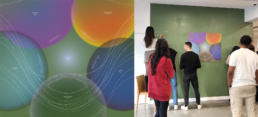
Présentation du projet
L’ISC est une école de commerce parisienne fortement positionnée et engagée sur la diversité et l’inclusion, ainsi que sur l’innovation pédagogique, notamment par son approche du Action Learning.
Conçu spécifiquement pour l’école qui souhaitait introduire une dimension artistique dans ses innovations, le projet Futurescape s’articulait autour d’une installation artistique et prospective exposée dans le hall de l’école et se déroulait en plusieurs séquences de fin 2023 à fin 2024.
L’installation comprend une nouvelle version du TAC Future Canvas avec toujours ses 5 sphères, accroché sur un grand mur peint en vert (couleur des tableaux d’école), sur lequel il est possible d’écrire au marqueur blanc.
En introduction du projet, le Masterclass « Art et Futurs Inclusifs », destiné aux étudiants du Master International (module pédagogique dirigé par Sabine Bacouel), permettait de montrer comment les expérimentations artistiques contribuent au futur et peuvent être des vecteurs d’innovation inclusive, notamment urbaine.
L’atelier Futurescape Lab (voir ci-dessous les détails), programmé pendant la Semaine de l’Apprendre de l’école, invitait les étudiants internationaux (niveau master), à explorer, en utilisant l’installation artistique, les enjeux de l’Intelligence Artificielle, grand thème de l’année de l’école.
Un long article paru dans le Livre Blanc de l’école a permis de mettre en lumière les bénéfices de l’expérimentation pédagogique, que ce soit : le principe de « futur lab » qui stimule l’engagement, l’imagination ou le désir de compréhension (donc de chercher de la connaissance et d’apprendre) ; la mise en scène et en espace de l’expérience qui permet d’avoir une bonne dynamique collective (action learning), de sortir du format du cours conventionnel, voire de transgresser le cadre de l’école (interdiction d’écrire sur les murs) ; le travail par l’image, le diagramme ou le grand format, qui permet de visualiser et de raisonner autrement ; la restitution publique des production à l’occasion d’un événement de l’école comme accélérateur de motivation pour faire un travail abouti ; etc.
Plusieurs événements à destination des entreprises partenaires de l’école rythmait l’année et ont permis de mettre en perspective et valoriser le projet parmi les innovations de l’école, tels que par exemple le partenariat stratégique avec le très prometteur Handilab, développé par la Fondation Fiminco à St Denis.
Atelier Futurescape Lab
L’atelier commençait par un temps de réflexion partagée sur l’ampleur des enjeux de l’IA grâce au diagramme qui permet d’appréhender l’ampleur des impacts et la bigger picture – et d’autant plus que ce diagramme est né d’une réflexion sur les enjeux prospectifs de l’IA, voir à ce sujet la genèse du TAC Future Lab.
Les étudiants étaient ensuite invités choisir des sous-thèmes, et à décrypter des images du futur de ces sous-thèmes produites par Chat GPT + Dall-e pour réfléchir à la vision du futur ‘imaginée’ par l’IA, affûter leur sens critique et gagner en discernement sur ses biais implicites.
Les trois sous-thèmes étaient : Future of Eating, Future of Work, et Future of Dating.
Venait ensuite un temps d’ouverture créative avec l’installation qui servait d’espace de brainstorming et de génération d’hypothèses prospectives sur le futur dans une vision élargie du monde, afin que les groupes croisent leurs étonnements, interrogations et idées. La possibilité de circuler dans l’espace, d’écrire sur le mur et d’échanger en toute liberté contribuait au décloisonnement de la réflexion.
Les groupes de travail avait ensuite pour tâche de construire une vision d’avenir de leur sous-thème sur de grandes planches visuelles, en se servant du TAC Future Canvas, d’images et d’informations recherchées en ligne.
Pour en savoir plus, télécharger l’article paru dans le Livre Blanc de l’école + qq images ci-dessous.
Research axes reminder
Axis 1: Transitions & Future Worlds
Axis 2: Foresight Methodology Innovation
Axis 3: Art & Future Research
Related articles
limit/no limit, Art & Design Research Conference, Paris, 2024
RBW zooms in on the TAC Future Lab work related to knowledge, whether it be the cognitive value of artistic formats,…
Designing Art-Based Future Labs, ZHdK, Zurich, 2023
RBW is invited to share the educational benefits of the experiments carried out in her various artistic, urban and…
Anticipated Worlds Festival, Cité of Sciences, Paris, 2022
The TAC Future Canvas here exhibited became a vast planisphere mapping the movements of the world toward alien…
Art & Future Labs as LX, Learning Planet Festival, 2022
RBW shared a wide range of artistic, urban and prospective research experiences (including TAC Future Lab), showing how…
Do They Dream of Electric Sheep?, Muzeum Susch, Switzerland, 2018
In this keynote, RBW shares her artistic and prospective reflections on the challenges raised by AI and the need to…
Future x IA x Speculative Design, Duperré Design School, Paris, 2018
In this workshop cycle on the future of/with AI, students discover the critical future challenges raised by AI, and…
Art, Innovation and Foresight Day, Louvre Lens Valley, 2024
Cultural Innovation and Foresight
in a world in transitions
“Art, Innovation and Foresight” Day, Louvre Lens Valley, Lens, 2024
Dedicated to the Louvre Lens innovation ecosystem and the members of the Louvre Lens Valley incubator’s acceleration program, this exploratory day included three masterclass sessions, followed by a workshop to analyze creative trends.-
The first allowed participants to discover the diversity of future approaches, from foresight to art, including design, innovation and science fiction. In the second, Raphaële Bidault-Waddington presented her various artistic and prospective labs, and the development of TAC Future Lab and its research tools (used in the workshop).
-
Serving as an introduction to the workshop the third session gave a panorama of transitions currently shaking up the world and shaping the challenges of future worlds. Then the future trend analysis workshop was co-constructed with the participants to address their more specific future challenges.
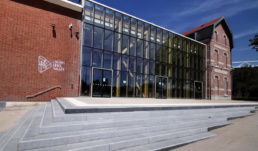
Présentation
Louvre Lens Valley, lieu hybride situé à proximité du musée du Louvre Lens, a été créé pour stimuler le développement de la région autour du musée. Il propose un programme d’accélération de projets dans le domaine des industries créatives et culturelles (ICC), et organise des événements tels que cette journée « Art, Innovation, Prospective » afin de fédérer, faire se rencontrer et fertiliser les écosystèmes d’innovation de la région.
Les participants de la journée sont issus des sphères aussi bien artistique et académique, qu’institutionnelle, entrepreneuriale ou associative.
Le premier masterclass donnait un aperçu de la diversité des approches du futur, que ce soit par l’innovation et le design, la prospective, l’aménagement territorial, la science-fiction, l’art, la modélisation des transitions ou l’analyse de tendance.
Dans le deuxième, RBW présentait son écosystème de recherche artistique et prospective remontrant de manière plus concrète comme l’art peut contribuer à l’innovation dans toutes ses dimensions – qu’elle soit technologique, durable, culturelle, sociale, territoriale, prospective, etc. -, puis le TAC Future Lab dont le diagramme méthodologique sera utilisé l’après-midi.
Le troisième masterclass (conférence iconique du TAC Future Lab, mais adaptée au public du Louvre Lens Valley), proposait une vision à 360° des grandes transitions environnementale, digitale et démographique qui font bouger le monde aujourd’hui, à approfondir en atelier…
Atelier
Afin d’optimiser la pertinence et l’utilité de l’atelier, les participants sont invités à choisir des thèmes prospectifs qui les concernent tout particulièrement et à se structurer en petit groupe de cinq personnes.
Après une présentation de la méthode et du TAC Future Canvas, chaque groupe mettait en marche une exploration des tendances comprenant : un temps de brainstorming, une recherche d’informations et d’images, un effort de reconceptualisation créative à l’aide du canevas et de planches de travail, ainsi que des temps de partages et de discussion avec les autres groupes.
Les groupes formés ont ensuite poursuivi ce travail d’amorce en toute autonomie pendant les semaines qui suivaient l’atelier, et en soutien du développement de leurs projets ou activités.
Research axes reminder
Axis 1: Transitions & Future Worlds
Axis 2: Foresight Methodology Innovation
Axis 3: Art & Future Research
Related articles
Researching the Future through Art, IFTF Foresight Talks, 2023
The prestigious Institute For The Future in Palo Alto invites RBW in this selective webinar series to present her…
SF and Innovation: Analysis of Ready Player One, Tech & Innovation Review, 2023
In this article, the TAC Future Canvas is used to audit the innovations and vision of the world expressed in the film…
Artistic Research For Future Challenges, A2RU x Learning Planet Festival, 2023
Panel with artistic research actors who explored the many levers of creativity, build bridges between artistic…
Future of Museums, Museum of Art and History, Geneva, 2022-23
This vast ‘future lab’ (10 months) on the future of museums has made it possible to sustainably instill prospective…
Futures Fields exhibition, HiFlow, Geneva, 2021-22
Designed as an algorithmic ‘open polygon’ and as a speculative design experiment, the exhibited installation allowed…
Our Knowledge Builds New Worlds, CNRS 80 yrs anniversary, Paris, 2018-19
This 'future lab' is created within the CNRS Communications Department to help its entire team (20 employees), to…
limit/no limit, Art & Design Research Conference, Paris, 2024
TAC Future Lab
opening new epistemological and pedagogical horizons
limit/no limit, AD REC (Art&Design), ENSCI, ENS Saclay and Paris Sorbonne 1 and 3 Universities, Paris, 2024
This presentation is an opportunity to zoom in on questions related to knowledge addressed at TAC Future Lab.If the experiments carried out make it possible to demonstrate the pedagogical and transdisciplinary virtues of the TAC Future Canvas, the presentation emphasizes the production of knowledge through art, whether (as in our case) through image-based research (moodboards), diagrams or the design of installations that are artistic, performative and heuristic.
-
On the other hand, the current transitions raise many challenges in terms of knowledge (post-truth, AI, learning and education for sustainability, post-colonial pluriversalism, etc.); the ongoing anthropological refoundation process is fully coupled with a epistemological refoundation to apprehend the world and think of its futures. The TAC Future Canvas is meant to open new perspectives on the diversity of epistemological frameworks.
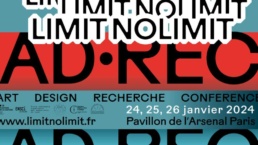
Abstract
Par son ampleur planétaire inédite, le contexte actuel de transitions multiples (monde VUCA, Deep Transition) est une invitation, si ce n’est une obligation, de repenser notre manière d’habiter la planète, de voir le monde et de nous projeter vers l’avenir. Comment refaire monde lorsque tous nos cadres anthropologiques et épistémologiques sont remis en question ?
A l’occasion de cette communication nous partagerons des éléments de recherche issus du TAC Future Lab (TAC pour Toward Alien Cosmologies – journal de recherche bientôt disponible sur tacfuturelab.org) menés depuis 2018. Son objectif est d’explorer comment concevoir de nouveaux mondes futurs dans une démarche d’innovation méthodologique transdisciplinaire mêlant prospective, art conceptuel, design, philosophie et pédagogie inclusive, parmi d’autres disciplines mobilisées dans les travaux du lab. Afin de s’émanciper des cadres épistémologiques conventionnels tout en respectant leur héritage et la possibilité de les relier, la création de nouveaux vocabulaires, architectures cognitives et ingénieries d’idées en est un point essentiel.
La démarche du lab inclue le design de diagrammes artistiques et méthodologiques, permettant d’ouvrir des espaces de recherche prospective radicalement transdisciplinaires et multidimensionnels (que nous appelons recherche polygonale), de croiser les savoirs et les points de vue, et d’explorer de nouvelles formes de monde. Ces dispositifs heuristiques, qui peuvent être spatialisés et mis en scène à l’occasion d’ateliers ou d’expositions, laisse leur place à l’imagination et à l’inconnu (ce que nous appelons le facteur alien), point sur lequel l’apport de l’art s’avère décisif et contribue à l’effort d’innovation pédagogique et d’empowerment du lab.
RBW
Intervention slides
A propos de limit/no limit, AD REC, Paris
La conférence limit/no limit, qui aura lieu du 24 au 26 janvier 2024 dans le cadre de Art Design Recherche Conference [AD•REC], invite les esprits créatifs, les chercheurs et les passionnés d’art et de design à se rassembler pour mener une réflexion sur la question de la limite dans le contexte de la recherche artistique et de la conception en France. Le comité scientifique a sélectionné 40 propositions sur plus de 150 qui reflètent une approche critique et réflexive, ainsi que des contributions qui présentent des exemples concrets de collaborations interdisciplinaires et résilientes.
Dans un monde façonné par la modernisation des sociétés et la diffusion rapide d’un modèle productiviste capitaliste mondialisé, cette conférence se veut une plateforme de réflexion critique et créative sur les défis sociétaux actuels. limit/no limit propose d’explorer différentes dimensions historiques et géographiques de la notion de limite, soulevant des questions cruciales.
Axes de recherche de la conférence :
1. RESSOURCES / La recherche en art et en design pour de nouvelles articulations entre communautés humaines et ressources naturelles.
2. SYSTÈMES / De quelle manière l’art et le design contribuent-ils à construire de nouveaux modèles de société ?
3. ÉPISTÉMOLOGIE / Comment l’art et le design contribuent-ils à la fabrication de nouveaux modes de savoirs ?
Site et programme de la conférence : limitnolimit.fr
Compte-rendu de toutes les inteventions sur le padlet de la conférence.
Research axes reminder
Axis 1: Transitions & Future Worlds
Axis 2: Foresight Methodology Innovation
Axis 3: Art & Future Research
Related articles
TAC World-building, 25th World Future Studies Federation Conference, Paris, 2023
This conference shows how the TAC Future Canvas was designed, how it rearticulates other tools and conceptual models…
Designing Art-Based Future Labs, ZHdK, Zurich, 2023
RBW is invited to share the educational benefits of the experiments carried out in her various artistic, urban and…
Artistic Research For Future Challenges, A2RU x Learning Planet Festival, 2023
Panel with artistic research actors who explored the many levers of creativity, build bridges between artistic…
Future visualization experiments, Exploring Next, Association of Professional Futurists, 2022
This intervention zoomed in on the artistic aspects of TAC Future Lab and presents in detail the TAC Future Canvas and…
Designing Post-Human Futures, Knowledge for the Anthropocene, 2021
This long essay lays the basis of TAC Future Lab methodological and transdisciplinary research, mixing learnings from…
‘Prototyping Futures’ Symposium, ‘Cybiosis’ Circle, NSU, Diffrakt, Berlin, 2020
This intervention was an opportunity to prefigure, share and discuss a first draft of the TAC Future Canvas, designed…
Researching the Future through Art, IFTF Foresight Talks, 2023
Researching the Future through Art
Foresight Talks webinar series
Institute For The Future (IFTF), Palo Alto, USA, 2023.
This webinar, organized by the prestigious Institute For The Future in Palo Alto, with which she had already worked in 2012, was an opportunity for RBW to present her entire ecosystem of artistic and prospective research, organized into different laboratories.-
Her artistic practices, whether those of her Image Lab, or the creation of artistic diagrams, allow her to introduce artistic materials and formats into prospective research experiments, especially in her R&D labs such as Paris Galaxies (2008-17), and TAC Future Lab.
-
The future insights she produces also emphasize the contribution of the cultural sphere to the making of the future, and all the more for the future of resilient cities.
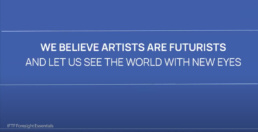
Webinar presentation
“When logic only gets us so far, art provides a creative free zone to explore and begin a mindset transition to future solutions”.
In this new episod of the Foresight Talks, IFTF invites Raphaële Bidault-Waddington, artist and futurist, founder of LIID Future Lab in Paris, in a conversation with Rachel Hatch, IFTF Chief Operating Officer.
During the session, RBW will come back on her hybrid background and artistic research journey, which lead her to become a futurist, and share some concrete projects – including with IFTF and Aalto University in 2012 -, showing how she designs transdisciplinary laboratories and methodologies.
As part of LIID Future Lab’s R&D, she carried from 2008 to 2017 a multi-awarded project on the future Greater Paris Metropolis at Paris 1 Pantheon Sorbonne University with an ecosystem of partnering schools, which allowed to experiment truly out of the box future research experiences on near and far futures (150 yrs ahead).
Since 2017, LIID’s latest R&D TAC Future Lab addresses the current Anthropocene, AI and post-humanist paradigm shift, which deeply shakes western anthropological and epistemological foundations, and explores new research strategies to co-create meaningful futures.
Recording of the webinar available on Youtube
Intervention slides
Research axes reminder
Axis 1: Transitions & Future Worlds
Axis 2: Foresight Methodology Innovation
Axis 3: Art & Future Research
Related articles
TAC World-building, 25th World Future Studies Federation Conference, Paris, 2023
This conference shows how the TAC Future Canvas was designed, how it rearticulates other tools and conceptual models…
Artistic Research For Future Challenges, A2RU x Learning Planet Festival, 2023
Panel with artistic research actors who explored the many levers of creativity, build bridges between artistic…
Art & Future Research, Alliance for Artistic Research in Universities, USA, 2022
RBW retraces the development of her laboratories, starting from their roots in the legacy of conceptual and…
Art & Foresight, 24th World Future Studies Federation Conference, Berlin, 2021
If Art and Time have a long joint history, it was shown here how artistic ecosystems can be envisioned as ‘signals of…
Art x Futures, ‘Blended Futures’ Foresight Journal panel, UNESCO FL Summit, 2020
Drawing on a large scope of international examples, the presentation builds on how artistic productions have been…
Do They Dream of Electric Sheep?, Muzeum Susch, Switzerland, 2018
In this keynote, RBW shares her artistic and prospective reflections on the challenges raised by AI and the need to…
Designing Art-Based Future Labs, ZHdK, Zurich, 2023
Designing Art-Based Future Labs
closing keynote
Labor Digital International Conference, ZHdK (Arts Academy), Zurich, 2023
In this conference at the Art academy of Zurich, Raphaële Bidault-Waddington is invited to present her various artistic and future research laboratories and to show how they foster transdisciplinary knowledge production and sharing, facilitating learning through investigation and collaborative experimentation.-
Her R&D lab Paris Galaxies on the Future of Greater Paris has made it possible to prototype numerous methodologies from 2012 to 2017, whether through images, stories, projects or workspaces - including in the urban space which becomes a playground and learning terrain. Following this lab, TAC Future Lab has been experimenting with other exploratory modalities since 2017.
–
In the introduction, she reformulates a definition of the laboratory as a conceptual and fluid framework to structure and carry a research process around critical issues, using a diversity of methodologies and formats, that can be artistic, academic, prospective, innovative, or hybrid.
Presentation
Raphaele Bidault-Waddington, is the founder of LIID Future Lab, a foresight research platform designing future labs in artistic, academic, urban and corporate contexts.
From 2012 to 2017, its multi-awarded lab on the future Greater Paris metropolis (with Paris 1 Pantheon Sorbonne University) prototyped a series of mixed future research and transdisciplinary pedagogic innovations. Its latest R&D lab “Toward Alien Cosmologies” addresses post-human futures and continues innovating at the frontier of future research, art and co-learning.
Interview following the conference
What does the format of the lab/laboratory mean to you?
Historically laboratories were specific spaces where to access certain tools, make experiences or design and test experimental protocols in order to extract learnings, to innovate or to produce (scientific and non-scientific) knowledge. The concept of laboratory is in fact rather fluid. In a more recent time, other types of laboratories without specific tools and places, such as learning lab, urban labs, living lab, future lab, art lab, and so on, have emerged. Philosopher Bruno Latour has even introduced the idea that the real world should be the laboratory to learn directly from.
As an alternative definition, in the last twenty years, I have been using the notion of laboratory as a conceptual frame to design, organize and unfold a research process, geared toward a certain critical challenge or topic, and combining experiences or experiments, and learnings (knowledge production and sharing). These learnings can be considered scientific if the lab respect academic rules and protocols, and positions them in relation to a discipline’s state of the art. But they can also be hybrid, peri-scientific or non-scientific when other methods, experiments and knowledge formats are used.
The labs I create as an artist-researcher and future lab designer, always have a speculative dimension, and mix artistic, future, urban and transdisciplinary academic research methods, experiences and formats. Then a laboratory can be very short or very long (from one day to several years), evolve through time (different than a project or a production with a clear expected output), more or less open and collaborative, and involve a small or large number of participants.
What’s your favorite project that explores the future with a lab perspective?
My most thrilling project at the moment is the future lab “Toward Alien Cosmologies” that I started in 2017 to explore Artificial Intelligence future implications, and then expanded to the Anthropocene and post-Truth paradigms, which raise similar holistic future challenges. This lab is my most advanced future research where I’m trying to design new ways of exploring possible future worlds (cosmologies) when everything and at all scales, is radically uncertain.
The Anthropocene requires that we reinvent the way we live on Earth; AI (and technologies) challenges human capacities, certitudes, and politics and raise deep ontological issues; and the post-Truth shakes our relation and trust in any form of truth, as if everything has become somehow alien. This paradigm calls for a profound anthropological and transdisciplinary epistemological reset, which cannot be address with conventional rationality and that’s why and where Art is important. This lab is certainly not reasonable, in all the senses that term can take.
It also echoes post-humanist questions and philosophies as I develop in my article “Designing post-human futures” in Knowledge For the Anthropocene (E. Elgar Press, 2021).
A dedicated website, recollecting all the lab’s research episodes (workshops, exhibitions conferences and publications in France, US, Norway, Germany, Switzerland, etc.) since 2017 is due later this year.
Suite de l’interview sur le site du E-Learning Lab de ZHdK
Intervention slides
About Labor Digital Conference
The conference will explore the questions of which scientific and historical foundations today’s labs are based on. Which exploratory learning and teaching forms, which interdisciplinary methods are lab-specific and what potential does the digital laboratory have for inspired, critical thinking?
Will the learning of the future take place in labs? Can experimental, explorative learning with experts and peers facilitate innovative forms of teaching and learning?
What role does digitality play, and what artistic and design-oriented approaches are we developing in labs? And how can we integrate these methods as small interventions in teaching practice or use them as an entire teaching unit? We will explore these questions analytically and playfully at the LaborDigital conference.
Programme de la conférence : https://paul.zhdk.ch/course/view.php?id=2312#section-2
Compte-rendu de la conférence : https://elearning.zhdk.ch/experience/labordigital-experimental-learnings-an-der-zhdk-1
Research axes reminder
Axis 1: Transitions & Future Worlds
Axis 2: Foresight Methodology Innovation
Axis 3: Art & Future Research
Related articles
Futurescape: Art x Future x Learning x IA, ISC Campus, Paris, 2023-24
Artistic and prospective exploration program over a year including an interactive installation, experiential workshops,…
limit/no limit, Art & Design Research Conference, Paris, 2024
RBW zooms in on the TAC Future Lab work related to knowledge, whether it be the cognitive value of artistic formats,…
Art & Future Research, Alliance for Artistic Research in Universities, USA, 2022
RBW retraces the development of her laboratories, starting from their roots in the legacy of conceptual and…
Art & Future Labs as LX, Learning Planet Festival, 2022
RBW shared a wide range of artistic, urban and prospective research experiences (including TAC Future Lab), showing how…
Art x Futures, ‘Blended Futures’ Foresight Journal panel, UNESCO FL Summit, 2020
Drawing on a large scope of international examples, the presentation builds on how artistic productions have been…
Future x IA x Speculative Design, Duperré Design School, Paris, 2018
In this workshop cycle on the future of/with AI, students discover the critical future challenges raised by AI, and…
Artistic Research For Future Challenges, A2RU x Learning Planet Festival, 2023
Artistic Research For Future Challenges
panel organized by A2RU (Alliance for Artistic Research in Universities)
Online program of the Learning Planet Festival, Learning Planet Institute (ex-CRI), Paris, 2023.
This highly open festival brings together each year a vast international academic and peri-academic community, engaged in the field of education, knowledge production for Sustainable Development, and inclusive pedagogical innovation.-
In this context, A2RU (federation of universities attached to the University of Michigan, USA) invited a selection of artistic research actors serving these goals, whether by deepening the levers of creativity, by creating bridges between artistic experimentation and innovation, by fostering trans-disciplinarity, and or by getting involved in foresight.
-
Raphaële Bidault-Waddington emphasizesd the specific vocabulary that she designs, such as the notions of idea engineering, aesthetic intelligence, polygonal research, and “art-based future research” to innovate on these different questions.
-
Dans ce cadre, A2RU (fédération d’universités rattachée à l’Université de Michigan, USA) invite des acteurs de la recherche artistique venant servir ces enjeux, que ce soit en approfondissant les leviers de la créativité, en créant des ponts entre expérimentation artistique et innovation, en favorisant la transdisciplinarité, et ou encore en allant vers la prospective.
-
Raphaële Bidault-Waddington met l’accent sur le vocabulaire spécifique qu’elle utilise, tel que les notions d’ingénierie d’idées, d’intelligence esthétique, de recherche polygonale, de « art-based future research » pour adresser ces différentes questions.
Panel presentation
In recent years, a growing number of researchers from the field of the Arts, are developing, in and beyond academia, innovative approaches to address the future and its critical challenges, such as the environment, post-coloniality or technologies, and have an increased impact on society.
The arts are a universal language. In our education systems and research methodologies, these essential tools and perspectives the arts offer have been underutilized. This group of creative futurists and arts-integrated researchers are working to re-integrate the arts to benefit learning and understanding of the earth and each other. Artists and creatives are known for methods that are speculative, non-reductive, and attend to both humanistic and natural concerns. This session will explore the promise and the power of the arts to address systemic problems.
For this exploratory round-table at the Learning Planet Festival, a2ru is pleased to invite four art-based researchers who are pursuing pioneering research practice, platforms and strategies to contribute to future research and positive change. Together, they will share their experience, and discuss how to better value and amplify that movement.
Participants in this roundtable are actively exploring and practicing creative integration in the public sector, higher education, and industry.
Speakers:
Aaron Knochel, Professor, Penn State University
R. Benjamin Knapp, Director, ICAT, Virginia Tech
Raphaële Bidault-Waddington, artist-researcher, futurist, LIID Future Lab
Theo Edmonds, Associate Dean/Co-Founder, University of Colorado Denver/Imaginator Academy
Moderator: Maryrose Flanigan, Executive Director, Alliance for the Arts in Research Universities (a2ru).
Recap : https://a2ru.org/recap-a2rus-artistic-research-for-future-challenges/
Research axes reminder
Axis 1: Transitions & Future Worlds
Axis 2: Foresight Methodology Innovation
Axis 3: Art & Future Research
Related articles
Do They Dream of Electric Sheep?, Muzeum Susch, Switzerland, 2018
In this keynote, RBW shares her artistic and prospective reflections on the challenges raised by AI and the need to…
Our Knowledge Builds New Worlds, CNRS 80 yrs anniversary, Paris, 2018-19
This 'future lab' is created within the CNRS Communications Department to help its entire team (20 employees), to…
Art & Future Labs as LX, Learning Planet Festival, 2022
RBW shared a wide range of artistic, urban and prospective research experiences (including TAC Future Lab), showing how…
Designing Art-Based Future Labs, ZHdK, Zurich, 2023
RBW is invited to share the educational benefits of the experiments carried out in her various artistic, urban and…
Researching the Future through Art, IFTF Foresight Talks, 2023
The prestigious Institute For The Future in Palo Alto invites RBW in this selective webinar series to present her…
Futurescape: Art x Future x Learning x IA, ISC Campus, Paris, 2023-24
Artistic and prospective exploration program over a year including an interactive installation, experiential workshops,…
Art & Future Research, Alliance for Artistic Research in Universities, USA, 2022
Art & Foresight
Introducing an Art-based and Future Research Ecosystem
A2RU Webinar Series, University of Michigan, USA, 2022.
A2RU, a network attached to the University of Michigan and bringing together some forty American universities committed to artistic research, invited Raphaële Bidault-Waddington to present her artistic and prospective research ecosystem.-
During this webinar, she recalled its genealogy, starting with its anchoring in the legacy of experimental and conceptual art which, since the 70s, has valued art process, experience or ideas, and dialogues with theory as well as with society.
-
For more than twenty years, her laboratories have allowed her to address the frontiers of art with many fields (urbanism, knowledge, economy, etc.) and particularly future research. TAC Future Lab continues and remobilizes all of her experiences, creations and knowledge production
Intervention slides
Webinar presentation
A2RU welcomes French artist and futurist Raphaële Bidault-Waddington to present her expanded art and future research ecosystem. Building on the heritage of conceptual art, her initial statement in 2000 was to consider art as a vast laboratory to explore, question and open critical perspectives on the world, and as a way to produce knowledge, eventually disrupting conventions, borders or disciplines.
Exhibited and published, her image laboratory addresses topics ranging from aesthetic speculation and value(s) creation to cities, metaverses and future world-building, from the digital transition to the post-truth paradigm. Her idea laboratory (renamed LIID Future Lab in 2016), also occasionally published or exhibited, experiments collaborations with organizations at the frontier of art with knowledge, economy, critical design, urban design, innovation and future studies.
From 2008 to 2017, her R&D lab on the future Greater Paris metropolis, hosted at ACTE Institute (Arts Research), Paris 1 Pantheon Sorbonne University, was laureate of several selective academic research and pedagogic innovation programs. Her latest R&D future lab Toward Alien Cosmologies focuses on post-human and post-colonial futures, the Anthropocene and the related anthropological and epistemological reset.
Watch the Webinar: https://a2ru.org/event/introducing-an-art-based-and-future-research-ecosystem/
About the Speaker
Raphaële Bidault-Waddington is an artist-researcher, author and futurist based in Paris and working internationally. Since 2000 she has cultivated an art-based research ecosystem organized in “labs” exploring the borders of art, contemporary world transformations, and hypothetical futures.
Her work has been exhibited in galleries such as Apex Art, in New York, Over Gaden Art Center in Copenhagen, gallery Forde in Geneva, and Colette and La Villette in Paris, and published in art and theory reviews such as Marges (Paris St Denis University), Pylone in Brussels, Les Cahiers Européens de l’Imaginaires in Paris and Susch Muzeum Magazine in Switzerland. Via LIID Future Lab, she has experimented collaborations with universities (e.g., CNRS, Aalto University Helsinki, Parsons School, Science-Po Paris, Lausanne University, IHEST, etc.), urban projects (Copenhagen, Montevideo, Shanghai, Tehran, etc.), cultural places (e.g., Atelier LUMA Arles, Geneva Museum of Art and History) and companies (e.g., Peclers Paris, Bouygue Real Estate, Chanel).
She is a member of international research networks on knowledge economy and futures studies.
All her exhibitions, publications, conferences and collaborations can be viewed on www.rbidaultwaddington.net
Research axes reminder
Axis 1: Transitions & Future Worlds
Axis 2: Foresight Methodology Innovation
Axis 3: Art & Future Research
Related articles
Art x Futures, ‘Blended Futures’ Foresight Journal panel, UNESCO FL Summit, 2020
Drawing on a large scope of international examples, the presentation builds on how artistic productions have been…
Art & Foresight, 24th World Future Studies Federation Conference, Berlin, 2021
If Art and Time have a long joint history, it was shown here how artistic ecosystems can be envisioned as ‘signals of…
Art & Future Labs as LX, Learning Planet Festival, 2022
RBW shared a wide range of artistic, urban and prospective research experiences (including TAC Future Lab), showing how…
Designing Art-Based Future Labs, ZHdK, Zurich, 2023
RBW is invited to share the educational benefits of the experiments carried out in her various artistic, urban and…
Researching the Future through Art, IFTF Foresight Talks, 2023
The prestigious Institute For The Future in Palo Alto invites RBW in this selective webinar series to present her…
Art, Innovation and Foresight Day, Louvre Lens Valley, 2024
Dedicated to the Louvre Lens innovation ecosystem, this ‘future lab’ day included three masterclasses on future and…
Artistic & Polygonal Research on Time multidimensionality, PRIMER, 2022
Exploring time multidimensionality
via an artistic and polygonal research
PRIMER 2022 Global Conference, online, 2022
Continuing our reflections on Art and the Future (Axis 3), here we conduct an experiment to deepen the question of Time and the evolution of temporal architectures in light of the current change in the world – such as the Anthropocene requiring to envision long term perspectives.-
The body and the human condition inscribe us in certain realities and temporal structures that are not necessarily immutable or universal. Space and cognitive diversity (post-colonial cosmologies), ubiquitous and virtual technologies, and scientific advances all impact our temporal frameworks, schemes, and representations.
-
Connected to our deepest beliefs, and especially those concerning the future, the experience of Time proves to be multi-dimensional, ambivalent, and infinite. These reflections open up avenues for imagining future cosmologies.
Abstract
Time is a deeply multi-dimensional, complex and paradoxical experience. On one hand, our senses are able to experience several parallel or entangled forms of time, through events progression inside the real time, whether in the physical environment, in vehicles, via sound, screens and technological devices, images, windows or the distant landscape.
On another hand, and simultaneously or not, our mind is also capable of disrupting the timeline to travel backward and forward, in various dimensions (history, fiction, metaverse, immaterial, cosmos, future, etc.), and thus generating other time shapes and more dynamic time experiences.
Using images, artworks and theoretical concepts from different fields (philosophy, aesthetics, musicology, urban design, etc.), we propose to draw a taxonomy of time shapes and experiences, via a multi-faceted and diagrammatic approach (polygonal research).
RBW
Intervention slides
About PRIMER 2022 Conference
PRIMER, the conference designed to prepare you for the future
In 2022, PRIMER seeks to explore a theme as old as philosophy: we want to share perceptions, experiences, and current state-of-the-art futures practices to look deep, wide, and far into what might soon become the next paradigms.
Experiences of Time
In an era of growing parallelisms and of age-old notions yearning to be redefined, we are brimming on a nexus where our individual and collective consciousness and our presences are increasingly manifesting in – and through – hybrid experiences.
It is certainly a defining time, one of those “perfect storms” in which we can proactively apply our speculative competences to the many challenges ahead envisioning futures with full awareness, with a sense of urgency, or doom. Or, simply, with inertia.
Our theme this year focuses on the experience of time.
Conference program on Instagram
Research axes reminder
Axis 1: Transitions & Future Worlds
Axis 2: Foresight Methodology Innovation
Axis 3: Art & Future Research
Related articles
Art x Futures, ‘Blended Futures’ Foresight Journal panel, UNESCO FL Summit, 2020
Drawing on a large scope of international examples, the presentation builds on how artistic productions have been…
Designing Post-Human Futures, Knowledge for the Anthropocene, 2021
This long essay lays the basis of TAC Future Lab methodological and transdisciplinary research, mixing learnings from…
Art & Foresight, 24th World Future Studies Federation Conference, Berlin, 2021
If Art and Time have a long joint history, it was shown here how artistic ecosystems can be envisioned as ‘signals of…
Ethics & Philosophy of Futures, Association of Professional Futurists, 2022
RBW introduced here the different philosophical references that irrigate the work of TAC Future Lab, whether in its…
Artistic Research For Future Challenges, A2RU x Learning Planet Festival, 2023
Panel with artistic research actors who explored the many levers of creativity, build bridges between artistic…
SF and Innovation: Analysis of Ready Player One, Tech & Innovation Review, 2023
In this article, the TAC Future Canvas is used to audit the innovations and vision of the world expressed in the film…
Art & Future Labs as LX, Learning Planet Festival, 2022
Art & Future Labs as Powerful Learning Experience (LX)
Experience sharing
Online masterclass, Learning Planet Festival, Learning Planet Institute, 2022.
During this interactive masterclass, RBW presented the educational aspects of her artistic, urban and prospective research laboratories, and showed how this type of exploratory practices, and more generally the 'lab culture', can be learning accelerators.-
The revaluation of this aspect of her experiences is part of a broader reflection on the role of training as a key lever for transitions and the making of the future, as well as on the future of learning in and outside the academic sphere.
-
The masterclass was organized in partnership with the LX Design MeetUp group, which fosters exchanges of best-practices between learning innovators in non-academic and inclusive contexts.
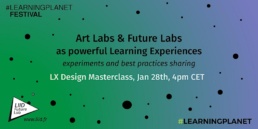
Webinar presentation on eventbrite
During this 90mn masterclass, Raphaële Bidault-Waddington, artist, researcher and founder of LIID Future Lab, will share a great diversity of artistic and future oriented experiments, showing how they become powerful learning experience (LX). Q&A will be taken for each presented case.
A broad scope of learning formats, contexts (school, academic research, work and culture) and profiles will be covered, from senior and highly educated executives, to Masters students or youth in difficulty, showing how, in all cases, a “creative lab” culture fosters learning desire, openness and empowerment. By definition, a “creative lab” thoroughly combines creativity, knowledge and experiment …
As a relaxed and discovery-oriented Friday afternoon, the discussion with participants will allow to collectively look for additional insights on creative pedagogy, futures literacy and LX innovation.
The zoom link is sent in the registration confirmation email.
Learning Planet Festival: https://festival.learning-planet.org/
Additionnal information: Tribune published by Raphaële Bidault-Waddington to advocate for training and creativity to tackle the Covid crisis in 2020: https://medium.com/@rbidaultwaddington/covid-19-an-economic-resilience-strategy-via-training-and-creativity-fffcd04b50f6
Intervention slides
Research axes reminder
Axis 1: Transitions & Future Worlds
Axis 2: Foresight Methodology Innovation
Axis 3: Art & Future Research
Related articles
Future x IA x Speculative Design, Duperré Design School, Paris, 2018
In this workshop cycle on the future of/with AI, students discover the critical future challenges raised by AI, and…
Future of Museums, Museum of Art and History, Geneva, 2022-23
This vast ‘future lab’ (10 months) on the future of museums has made it possible to sustainably instill prospective…
Artistic Research For Future Challenges, A2RU x Learning Planet Festival, 2023
Panel with artistic research actors who explored the many levers of creativity, build bridges between artistic…
Designing Art-Based Future Labs, ZHdK, Zurich, 2023
RBW is invited to share the educational benefits of the experiments carried out in her various artistic, urban and…
Art, Innovation and Foresight Day, Louvre Lens Valley, 2024
Dedicated to the Louvre Lens innovation ecosystem, this ‘future lab’ day included three masterclasses on future and…
Futurescape: Art x Future x Learning x IA, ISC Campus, Paris, 2023-24
Artistic and prospective exploration program over a year including an interactive installation, experiential workshops,…
